Ashley and I had the privilege of seeing Beyoncé this past weekend, and my creative mind is still reeling from everything I witnessed. Back in March, I listened to Cowboy Carter and was immediately enthralled by the story, the history, and the melodies—it is a masterpiece, I decided. Paired with Lemonade, this is Beyoncé at her absolute best. Seeing her on a Cowboy Carter tour quickly became a bucket list item, and earlier this year, that dream became a real possibility when she announced her nine-city tour. Three pre-sales later, and it was official: I was going to see Beyoncé for the first time in Atlanta. What I walked away with, however, far exceeded even my wildest expectations.
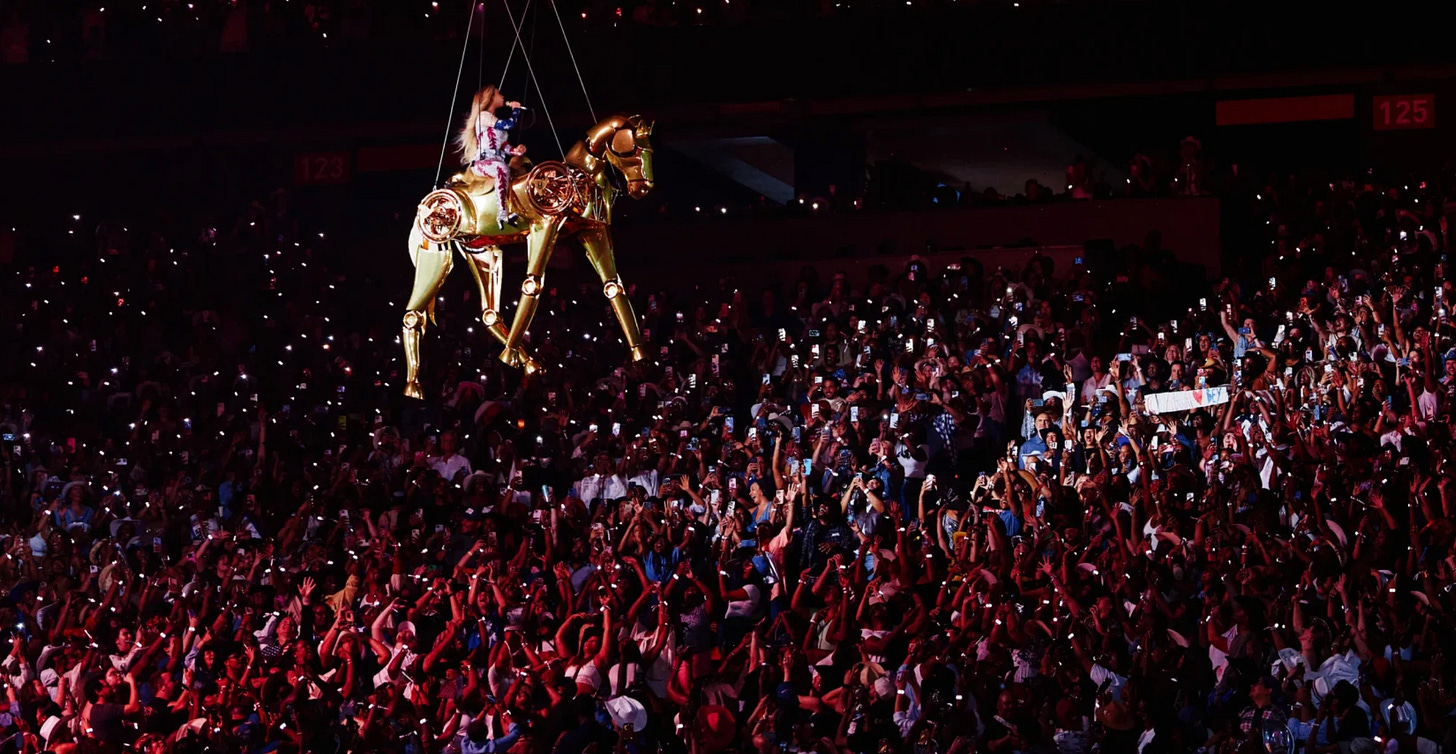
I’ve always been enamored with Beyoncé. She feels almost like a folk legend to me. What she’s created—the culture she’s shaped—feels nearly mythical. The alleged scandals and absurd rumors (looking at you illuminati) have followed her largely because of her choice to remain private (I could also rant about the racist undertones in how our society seems incapable of allowing a Black woman to smash records and thrive in uncharted musical territory without suggesting it’s somehow “rigged/paid off” or the work of the Devil himself). She has never defended herself, never set the record straight, and during Cowboy Carter, I think I began to understand why.
First and foremost, Beyoncé is an artist’s artist. She has something to say about the world—more specifically, the country we live in. What sets her apart from most mainstream artists today is exactly that: she speaks to our current reality, using metaphor, symbol, and cultural trends. Cowboy Carter is an invitation to revisit Black history through music, honoring the Black musicians who paved the way before her. And on that tour, I found she was also reminding her Black audience of who they are.
Honestly, even as someone who isn’t Black, I felt like she was reminding me of who I am, too—an American. Coming from a white evangelical background, I’ve often been challenged—and at times ostracized—for my critiques of this country (and the rise of Christian nationalism). Beyoncé, however, embraces the critiques while still proudly waving the American flag. She sees no contradiction in calling out the United States for what it is, while also demanding that it finally make good on its promises of liberty and justice for all. I felt seen in my frustrations with the United States and the reality that I am an American, a member of the Empire. In one of the most powerful moments of the show, she begins singing the National Anthem, but before finishing, transitions into her powerful Freedom, while blasting the words “Never ask permission for something that already belongs to you.” This is my country.
Freedom, freedom, I can't move
Freedom, cut me loose, yeah
Freedom, freedom, where are you?
'Cause I need freedom, too
I break chains all by myself
Won't let my freedom rot in hell
Hey, I'ma keep running
'Cause a winner don't quit on themselves
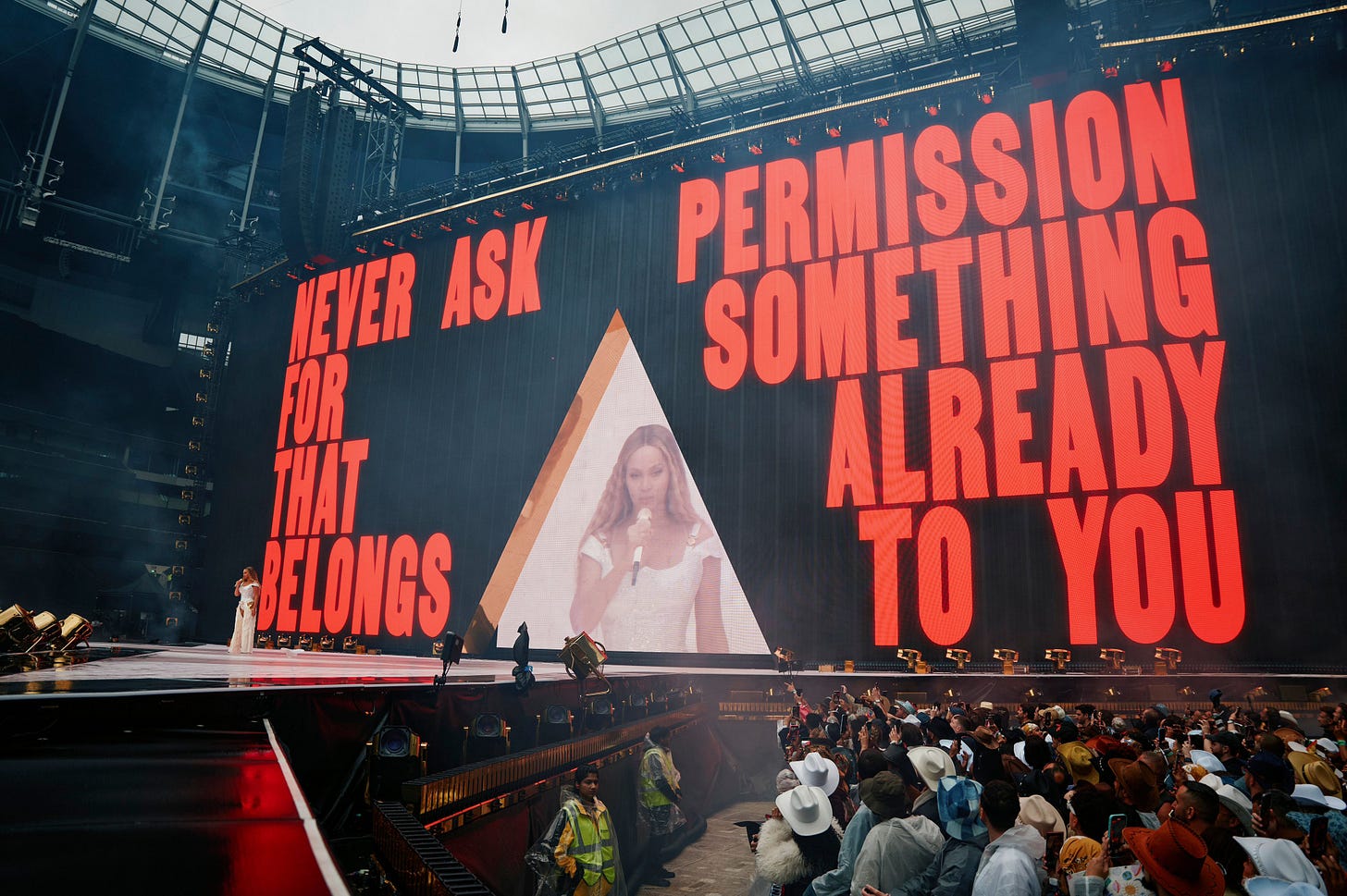
As the show progressed, the history lesson deepened. Video vignettes—featuring countless stunning looks (she’s breathtaking) and a variety of locations (tell me how she would put together an entire look on location somewhere and use 4 seconds of the footage- INSANE)—connected each piece of the show and kept the narrative in motion. This wasn’t just a concert; it was theater. Her costume changes were fashion-forward, the sets were meticulously crafted, and the projections lit up both the massive screen and the stage itself. And let me tell you—this woman walked that catwalk over and over, and it spanned nearly three-quarters of a football field! The choreography was as sharp as Michael in his prime, and yes, the mic was on. She sang the roof off. (Not to mention the two times flying over the audience). This is an entertainer—an artist—unmatched by any living performer. I’ve never felt more confident making that claim.
But back to my original point: throughout the show, her message was clear—we owe no response to the chatter around us. In the opening number, American Requiem, she says, “There’s a lot of talking going on / while I sing my song / can you hear me? / I said, ‘Do you hear me?’” She goes on,
They used to say I spoke, ‘Too country’
And the rejection came, said I wasn't, ‘Country 'nough’
Said I wouldn't saddle up, but
If that ain't country, tell me, what is?
Plant my bare feet on solid ground for years
They don't, don't know how hard I had to fight for this
When I sing my song
This is the thesis of Cowboy Carter: What is Country Music? Who decides? And a more poignant question: What does it mean to be an American? Who gets to decide? (She also deconstructs genre, and points to the history of country music - a Black creation, we could talk for hours about this, but I digress) These questions feel more urgent than ever in an age of unjust deportations, peaceful protests being branded as acts of violence, and a disturbing lack of due process. On a more personal level, the show challenged my insecurities. The lesson? People will always talk—let them. They’ll always have opinions—stay unbothered. Keep challenging. Keep creating. Keep going. In My House (and from the center of her gut) she sang “[if you] Don't give a f*** about my (House) / Then get the f*** up out of my house / Get the f*** up out my house.” She is defiant and bold. If you have a problem with her, get out of her way. Interestingly, she goes on,
I will always love you (Oh, house, house)
But I'll never expect you to love me (Oh, house, house)
When you don't love yourself (Oh, house, house)
Let's heal the world (Oh, house, house)
One beautiful action at a time (Oh, house, house)
This is real love
Lend your soul to intuitions (This is real)
RENAISSANCE, new revolution
Pick me up even if I fall
Let love heal us all, us all, us all
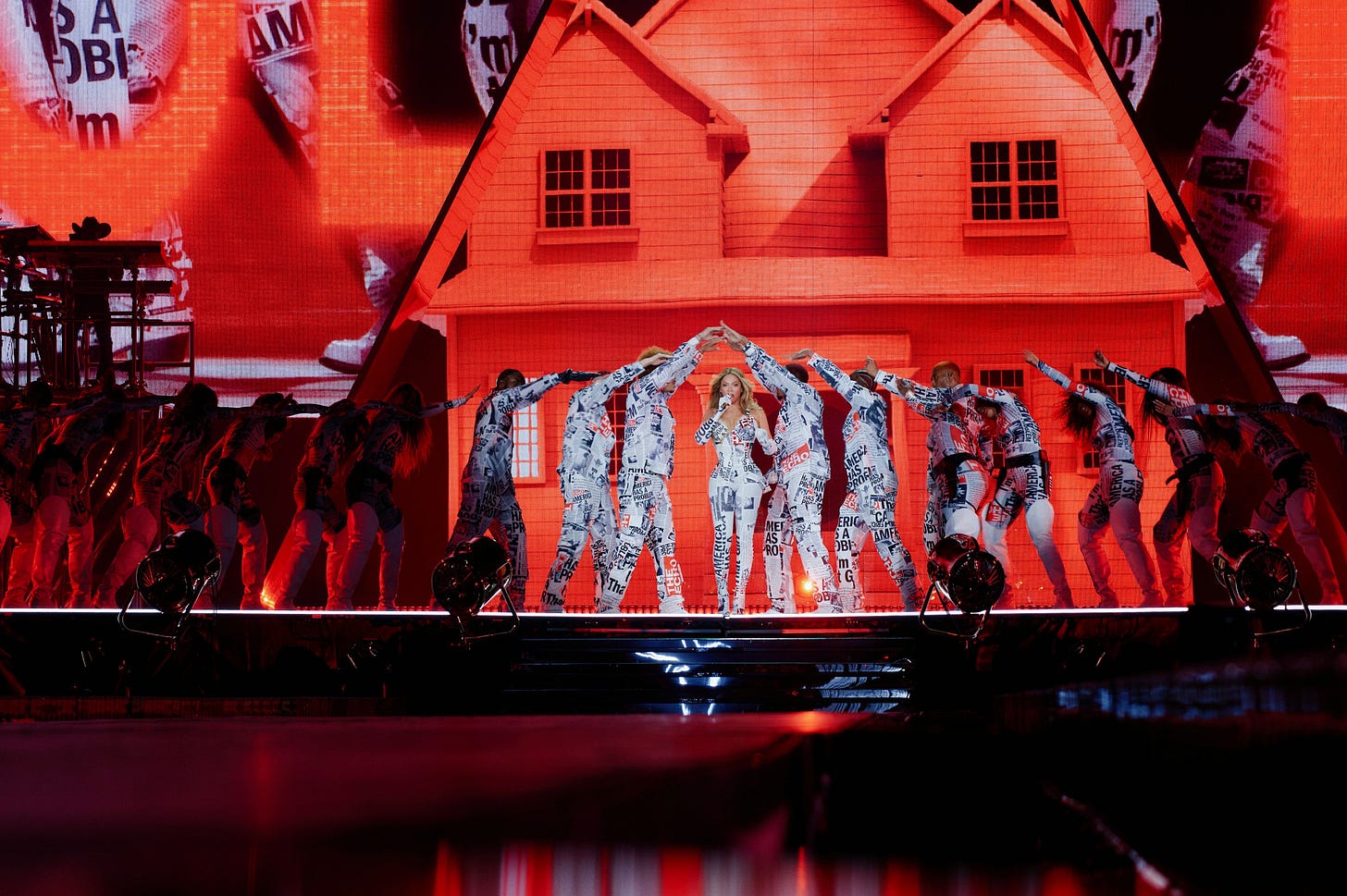
I’m not trying to turn this into a gospel hit—don’t tempt me—but what a redemptive bridge. She’s unwavering in her stance, yet full of mercy. A word. Come on, Louis, be bold. If they aren’t for you, dust off your feet, move on, and love them anyway. The same goes for the gatekeepers and the ones who are determined to misunderstand us.
Towards the end of the show, it became a kind of retrospective of her life and career. There is a video montage starting with her as a child singing and moving through the various stages of this woman’s career and personal life (we see the pregnancy announcements and births of all three of her children). Legacy is the focus of her second-to-final song, 16 Carriages. She sang, “The legacy, if it's the last thing I do /
You'll remember me 'cause we got somethin' to prove / In your memory, on a highway to truth / Still see our faces when you close your eyes.”
We all have the opportunity to be remembered, the question is what will we be remembered for? Life is too short to give a response to everyone who asks of you. Let them talk. My job isn’t to heal the world, but I will gladly point to the ultimate Healer. My job isn’t to correct every incorrect assumption about my motivations or actions, but I will gladly have a conversation with those who care enough about me. I’ve grown too distracted by the voices around me, thanks to Queen Bey, I’m reminded to tune them out and sing my song.




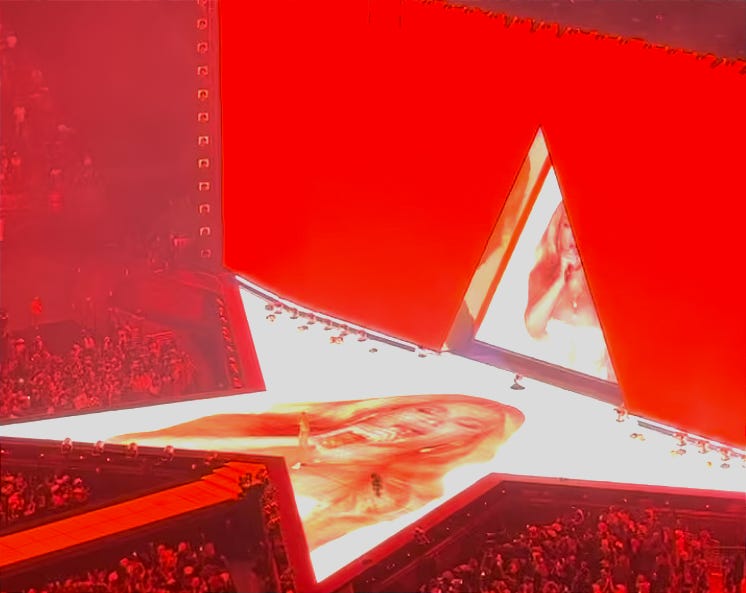
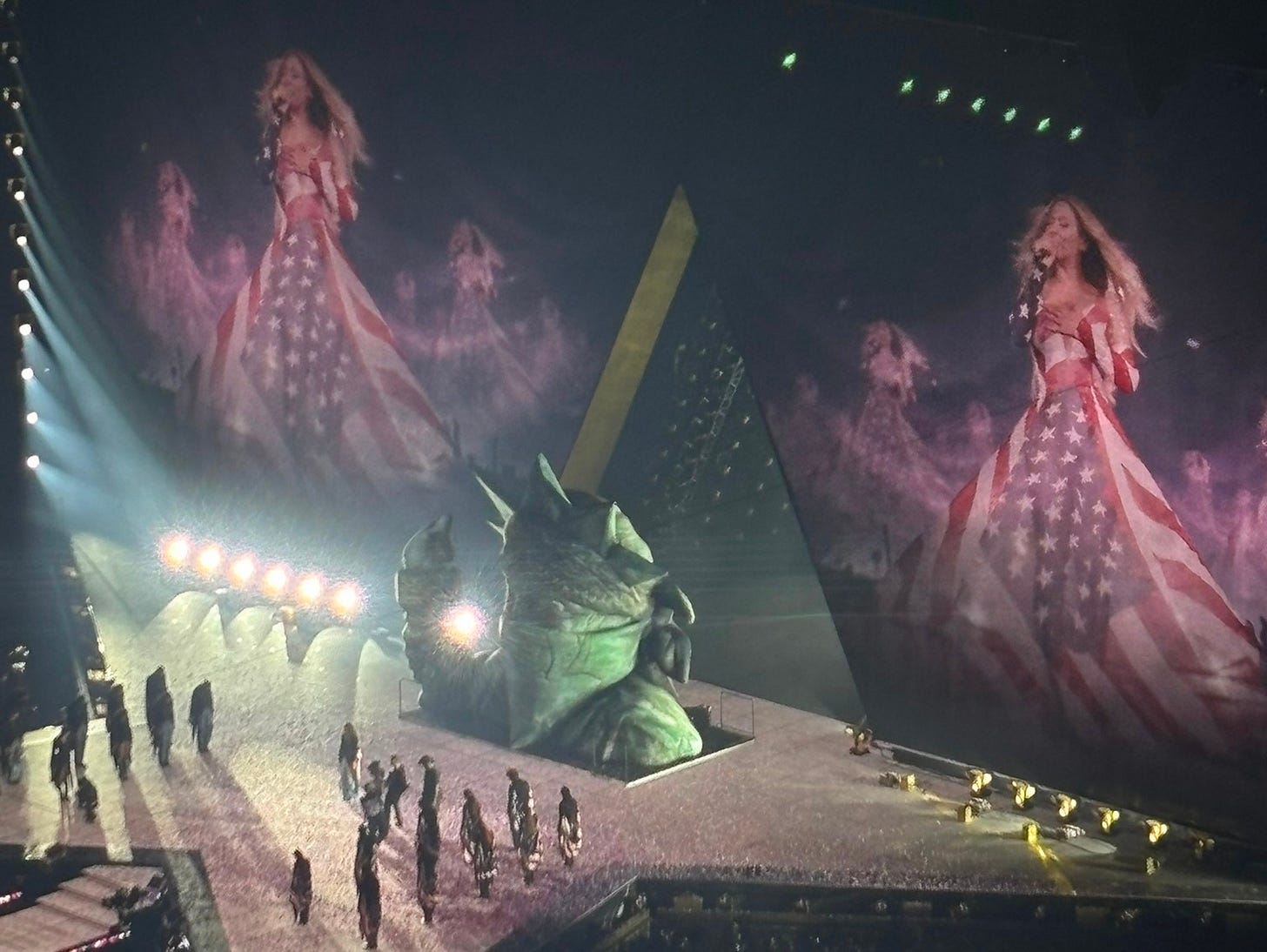
Wow. This felt like a deep exhale I didn’t know I needed.
“Let them misunderstand you. Let them go.”
There’s so much peace in surrendering the need to control the narrative. Thank you for the reminder that grace doesn’t always look like holding on, sometimes it’s the quiet strength of letting go.